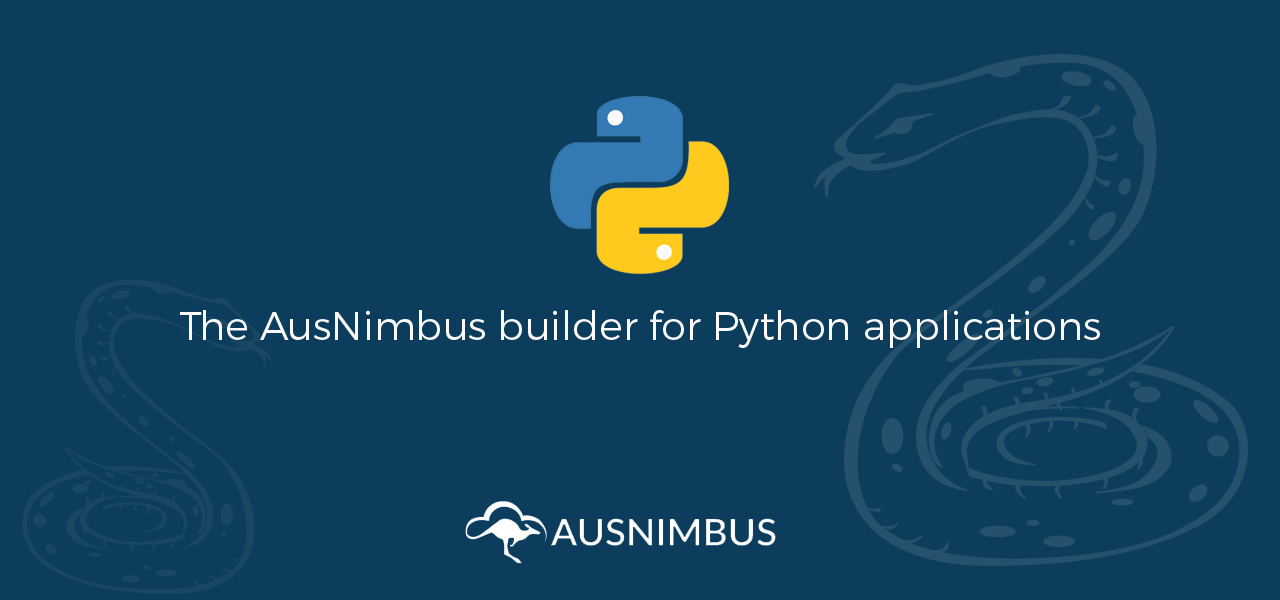The AusNimbus builder for Python provides a fast, secure and reliable Django, Flask and Python hosting environment.
This document describes the behaviour and environment configuration when running your Python apps on AusNimbus.
- Runtime Environments
- Web Process
- Dependency Management
- Advanced
- Extending
- Debug Mode
- Troubleshooting
AusNimbus supports the major Python versions.
The currently supported versions are 2.7 and 3.6
Your application's web processes must bind to port 8080.
AusNimbus handles SSL termination at the load balancer.
This builder is optimized for web frameworks such as Django and Flask.
The recommended webserver is Gunicorn and supports automatic optimization.
The builder uses the pip for installing dependencies.
If your Python application contains a setup.py file but excludes a requirements.txt.
python setup.py develop will be used to install your application and dependencies.
If you have a requirements.txt file but would like to run python setup.py develop,
you can add the following to your requirements.txt file:
-e .
By default pip will be executed with the version packaged in the current builder. If you would like to have pip upgraded to the latest version you may set the following environment variable:
| NAME | Description |
|---|---|
| PIP_UPGRADE | Set to TRUE to upgrade pip, setuptools and wheel before installing dependencies |
If you would like to use a custom pip mirror you may use the following environment variable:
| NAME | Description |
|---|---|
| PIP_INDEX_URL | Define a custom pip mirror for downloading dependencies |
The builder will attempt to detect your Gunicorn GUNICORN_APP_MODULE to run your application.
This variable specifies a WSGI callable with the pattern
MODULE_NAME:VARIABLE_NAME, where MODULE_NAME is the full dotted path
of a module, and VARIABLE_NAME refers to a WSGI callable inside the
specified module. Gunicorn will look for a WSGI callable named application if not specified.
The builder will attempt to look for a wsgi.py file in your project and use it if it exists.
If you are using setup.py for installing the application, the MODULE_NAME part can be read from there.
The auto detection may be undesirable, so it is recommended you set the following environment variable:
| NAME | Description |
|---|---|
| GUNICORN_APP_MODULE | This variable specifies a WSGI callable with the pattern MODULE_NAME:VARIABLE_NAME |
The builder provides a standard Gunicorn configuration however you may alternatively specify another location for your Gunicorn config:
| Name | Description |
|---|---|
| GUNICORN_CONFIG | Path to your Gunicorn configuration file. |
If you are using the builder provided (fallback) Gunicorn config we automatically tune the number of workers for you based on the app instance size.
| Size | Value |
|---|---|
| Small | 2 Workers |
| Medium | 4 Workers |
| Large | 6 Workers |
| 2xLarge | 10 Workers |
You may optionally change these default settings by configuring the following environment variable:
| NAME | Description |
|---|---|
| WEB_CONCURRENCY | Set the number of Gunicorn workers. By default, it is calculated as above. |
If you are not using the default Gunicorn config the calculated WEB_CONCURRENCY variable is still made available to you.
On AusNimbus your application runs behind a load balancer. To ensure the correct client IP address is received by the application Gunicorn's ForwardedAllowIPS is set to *
You may optionally change these default settings by configuring the following environment variable:
| NAME | Description |
|---|---|
| FORWARDED_ALLOW_IPS | Set this to change Gunicorn's ForwardedAllowIPS setting. (Default: *) |
Django does not support serving static files in production. Instead it is recommended to integrate the WhiteNoise package into your Django application.
Django applications on AusNimbus automatically have python manage.py collectstatic --noinput run during the build stage.
If you want to disable the execution of collectstatic you may set the following environment variable:
| NAME | Description |
|---|---|
| DISABLE_COLLECTSTATIC | Set to "TRUE" to disable the automatic execution of collectstatic |
AusNimbus builders are split into two stages:
- Build
- Runtime
Both stages are completely extensible, allowing you to customize or completely overwrite each stage.
If you want to customize the build stage, you need to add the executable .s2i/bin/assemble file in your repository.
This file should contain the logic required to build and install any dependencies your application requires.
If you only want to extend the build stage, you may use this example:
#!/bin/bash
echo "Logic to include before"
# Run the default builder logic
. /usr/libexec/s2i/assemble
echo "Logic to include after"If you only want to change the executed command for the run stage you may the following environment variable.
| NAME | Description |
|---|---|
| APP_RUN | Define a custom command to start your application. eg. python wsgi.py |
NOTE: APP_RUN will overwrite any builder's runtime configuration (including the Debug Mode section)
Alternatively you may customize or overwrite the entire runtime stage by including the executable file .s2i/bin/run
This file should contain the logic required to execute your application.
If you only want to extend the run stage, you may use this example:
#!/bin/bash
echo "Logic to include before"
# Run the default builder logic
. /usr/libexec/s2i/runAs the run script executes every time your application is deployed, scaled or restarted it's recommended to keep avoid including complex logic which may delay the start-up process of your application.
The recommend approach is to set your environment variables in the AusNimbus dashboard.
However it is possible to store environment variables in code using the .s2i/environment file.
The file expects a key=value format eg.
KEY=VALUE
FOO=BAR
The builder will attempt to guess how it can start your web process only if these conditions are met:
- Execute the command defined in environment variable
APP_RUN - Have a valid
wsgi.pyfile for Gunicorn or - Have a valid
app.pyfile
As none of these conditions are met, the easiest way will be to specify your launch command with APP_RUN
